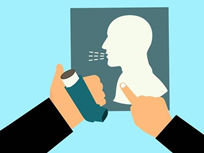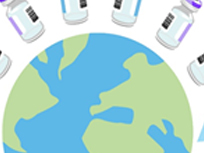
 As portfolio strategies of generic companies evolve to target more complex products, inhalation drugs top the wishlist considering relatively lean competitive landscape and high barriers to entry for both drug formulation as well as device combinations. A notable development this month was foray of a leading generic company into the more complex product category of extra fine inhalation formulations. With the launch of Niveoli™ in India, Cipla crossed yet another milestone in respiratory inhalation therapy. It’s notable that this is India’s first generic launch of extra-fine particle beclomethasone-formoterol combination hydrofluoroalkane (HFA) inhaler or any product with an extra-fine formulation of an inhaled corticosteroid and beta agonist. The extra-fine formulations have validated benefits in targeting drug delivery to the small airways which have traditionally been a challenging area to target medications, thus serving an unmet need in the treatment of small airway obstruction disease. Though the generic was launched only in India, it is a strong validation of platform strength generic pharma companies are deepening and is reflective of their near to mid-term global portfolio aspirations.
As portfolio strategies of generic companies evolve to target more complex products, inhalation drugs top the wishlist considering relatively lean competitive landscape and high barriers to entry for both drug formulation as well as device combinations. A notable development this month was foray of a leading generic company into the more complex product category of extra fine inhalation formulations. With the launch of Niveoli™ in India, Cipla crossed yet another milestone in respiratory inhalation therapy. It’s notable that this is India’s first generic launch of extra-fine particle beclomethasone-formoterol combination hydrofluoroalkane (HFA) inhaler or any product with an extra-fine formulation of an inhaled corticosteroid and beta agonist. The extra-fine formulations have validated benefits in targeting drug delivery to the small airways which have traditionally been a challenging area to target medications, thus serving an unmet need in the treatment of small airway obstruction disease. Though the generic was launched only in India, it is a strong validation of platform strength generic pharma companies are deepening and is reflective of their near to mid-term global portfolio aspirations.At the formulation and packaging end, Hovione Technology added momentum to packaging and delivery innovation by securing global rights to develop and commercialize a new multi-use blister-based dry powder inhaler, Papillon DPI, patented by inventor Dr. Klaus-Dieter Beller. This simple-to-use blister based inhaler promises cost-effectiveness claiming that the cost of goods per dose is competitive to that of a multi-dose inhaler but at a small fraction of the development cost. It also overcomes the risks associated with complex devices: a paradigm shift for pharmaceutical companies developing new inhaled drugs. With substantial corporate investment appetite and innovation momentum, we perceive level of strategic partnerships in inhalation to only expand in the near future.
 Demand led growth in volume as well as evolving portfolio strategy of pharma companies contributes to the positive outlook for the pharmaceutical packaging segment. With demand dovetailing current pharma industry thrust for pipeline shaping, high spurt is expected in the near to mid-term in primary packaging products for injectables such as vials, ampoules, syringes and cartridges. The packaging industry in turn needs to expanding thrust on ensuring drug stability, ease of administration, simple processing on filling lines and a fast time to market among others. This calls for action from global pharmaceutical packaging industries to expand their business capabilities, as is evident from the $1 billion investment by SCHOTT in the expansion and development in the following areas: building a new production facility in China, expanding operations in India, new production facility for SCHOTT TOPPAC® ready-to-use polymer syringes, ramping up production for the new high-value vial EVERIC™, among other expansion goals. At the same time, West Pharmaceuticals, another global leader in innovative solutions for injectable drug administration, aims to expand its presence in the region by setting up a sales office in Korea with the acquisition of GIS Korea Ltd., a privately-owned medical device and healthcare products distributor serving the Korean market. Both investments also reinforce importance of the Asia-Pacific region in the biopharmaceuticals industry where we expect that high volume manufacturing will continue to be concentrated.
Demand led growth in volume as well as evolving portfolio strategy of pharma companies contributes to the positive outlook for the pharmaceutical packaging segment. With demand dovetailing current pharma industry thrust for pipeline shaping, high spurt is expected in the near to mid-term in primary packaging products for injectables such as vials, ampoules, syringes and cartridges. The packaging industry in turn needs to expanding thrust on ensuring drug stability, ease of administration, simple processing on filling lines and a fast time to market among others. This calls for action from global pharmaceutical packaging industries to expand their business capabilities, as is evident from the $1 billion investment by SCHOTT in the expansion and development in the following areas: building a new production facility in China, expanding operations in India, new production facility for SCHOTT TOPPAC® ready-to-use polymer syringes, ramping up production for the new high-value vial EVERIC™, among other expansion goals. At the same time, West Pharmaceuticals, another global leader in innovative solutions for injectable drug administration, aims to expand its presence in the region by setting up a sales office in Korea with the acquisition of GIS Korea Ltd., a privately-owned medical device and healthcare products distributor serving the Korean market. Both investments also reinforce importance of the Asia-Pacific region in the biopharmaceuticals industry where we expect that high volume manufacturing will continue to be concentrated.A similar trend is also observed in the medical devices industry where high product demand is spurring business partnerships and acquisitions among packaging providers. The recent acquisition of Amcor’s three manufacturing facilities by Tekni-Plex for a value of $215 million is a strategic step in this direction to expand their portfolio for medical device manufacturers.
 As we advance towards the expectation that US FDA will approve 10 to 20 cell and gene therapies a year by 2025, level of engagement continues to intensify with significant developments this month across large pharma companies as well as ecosystem shaping stakeholders.
As we advance towards the expectation that US FDA will approve 10 to 20 cell and gene therapies a year by 2025, level of engagement continues to intensify with significant developments this month across large pharma companies as well as ecosystem shaping stakeholders.Another large pharma company stepped into the ring this month with Takeda announcing the partnership with Stride Bio Inc. The collaboration and licensing agreement encompasses developing in vivo AAV based therapies for Friedreich’s Ataxia (FA) and two additional undisclosed targets, utilizing novel AAV capsids developed by Stride Bio.
Equally existing are developments that reflect an evolving provider ecosystem for cell therapy companies. As pharma companies’ investment soars, both specialist service providers and bioprocess equipment and consumables companies grapple to meet the evolving demand landscape. While demand is yet to mature, it is critical for these providers to drove adoption early in the manufacturing process development to be able to participated in the future opportunity of scale. Global contract drug manufacturer Catalent announced an all-cash acquisition of Paragon Bioservices that focusses on contract development and manufacturing of gene therapies delivered via adeno-associated virus (AAV) vectors, as well as next-generation vaccines, oncology immunotherapies (oncolytic viruses), and other complex biologics. Pall Corporation also signed an industry participation agreement with New Jersey Innovation Institute (NJII) to support development of its Biopharmaceutical Innovation iLab which will advance the manufacturing of cell and gene therapies. The center will focus on addressing manufacturing process technologies and workforce development challenges faced by the industry. State-of-the-art bioreactors, continuous chromatography units, and an acoustic wave separator have been provided by Pall to NJII as part of the agreement. Pall experts will also be deployed to support the experimental program and provide training on the new equipment. Rapid portfolio shaping, engagement with upstream stakeholders in the innovation continuum and end to end capability will be key for success of bioprocess providers. With 2018 and 2019 turning out to be foundational for adoption of next generation therapies, we expect this partnership landscape to further intensify in the coming moths.
 The month has been significant for approval and launch momentum for biosimilars across global markets, both regulated and RoW. Canada approved Celltrion and Teva’s biosimilar rituximab, Truxima, for the treatment of adults with non-Hodgkin lymphoma, chronic lymphocytic leukemia, and rheumatoid arthritis. The same drug was previously approved in USA in November 2018, but only for the oncology indication. This month also saw trastuzumab launches in India (Eleftha) and Spain (Trazimera) by Intas and Pfizer respectively. Finally, Generium Pharmaceutical received the Russian marketing approval for its biosimilar eculizumab, referencing Alexion’s Soliris, the most expensive orphan drug in Russia. This also highlights an intriguing portfolio pivot by certain bioimilar companies – rare disease biologicals. While several large drug franchises for rare diseases appear attractive due to large market size of innovator drug, the sustainability of the strategy is yet to be understood given the concerns on rapid collapse with low volumes and intensifying trend of high price erosions.
The month has been significant for approval and launch momentum for biosimilars across global markets, both regulated and RoW. Canada approved Celltrion and Teva’s biosimilar rituximab, Truxima, for the treatment of adults with non-Hodgkin lymphoma, chronic lymphocytic leukemia, and rheumatoid arthritis. The same drug was previously approved in USA in November 2018, but only for the oncology indication. This month also saw trastuzumab launches in India (Eleftha) and Spain (Trazimera) by Intas and Pfizer respectively. Finally, Generium Pharmaceutical received the Russian marketing approval for its biosimilar eculizumab, referencing Alexion’s Soliris, the most expensive orphan drug in Russia. This also highlights an intriguing portfolio pivot by certain bioimilar companies – rare disease biologicals. While several large drug franchises for rare diseases appear attractive due to large market size of innovator drug, the sustainability of the strategy is yet to be understood given the concerns on rapid collapse with low volumes and intensifying trend of high price erosions.The most encouraging developments this month are on early market creation levers surfacing for the most elusive yet attractive biosimilar market thus far, the United States. Though approvals by the FDA have been forthcoming, the industry still glares at the currently unrealized possibility of an active commercial market. Early encouragement stems from Megellan Rx Management, a pharmacy benefit manager reporting that its biosimilar management program resulted in strong biosimilar uptake. In the case of infliximab biosimilar, the plan was able to achieve a 86% biosimilar use. This switch is reported to have saved health plan members 34% in drug costs for the therapy. While this data from one PBM is a great initial reason to rejoice, it is still not reflective of the broader market scenario. Return realization for several biosimilar developers and continuing corporate investments in the biosimilar segments hinges further intensified market creation efforts. As we look forward, we anticipate two triggers to paly an important catalytic role – a higher level of price driven market creation or FDA blessing through designation of interchangeability.
 The potential of AI and ML applications in healthcare is widely appreciated; but cross-stakeholder momentum needed for converting this potential into widespread impact has been largely elusive. In this context, the roadmap laid out with strong support across regulatory, clinical and industry stakeholders for AI in medical imaging is very encouraging. We believe that this could be catalytic for market creation.
The potential of AI and ML applications in healthcare is widely appreciated; but cross-stakeholder momentum needed for converting this potential into widespread impact has been largely elusive. In this context, the roadmap laid out with strong support across regulatory, clinical and industry stakeholders for AI in medical imaging is very encouraging. We believe that this could be catalytic for market creation.
The foundational research roadmap was published this month in the journal Radiology. It summarizes discussions at a workshop hosted by NIH in Maryland and was co-sponsored by National Institute of Biomedical Imaging and Bioengineering, the Radiological Society of North America, the American College of Radiology, and the Academy for Radiology and Biomedical Imaging Research. In addition to emphasizing a strong collaborative commitment, it includes specific priorities such as validated methods for image de-identification and data sharing to facilitate availability of wider data sets, automated image labeling and annotation methods etc.
The cross-stakeholder engagement comes at an opportune time given the high level of innovation, funding and startup momentum in AI in medical imaging. Strong validation is noted in another funding milestone this month – $27million Series B funding raised by Aidoc, an Israel-based provider of AI solutions for radiologists. This investment will go towards expanding Aidoc’s technology and go-to-market team to support the high market demand for its products. An energetic venture landscape, support of the investor community and the latest development on cross-stakeholder convergence to foster adoption and market creation – we look forward with enthusiasm on potential disruptions at the anvil!

Featured Mandates:
1. Divestiture of rapidly growing secondary pharmaceutical packaging company with strong roster of clients
2. Divestiture of midsize IVD diagnostic company (reagents & POC) in India with robust market footprint and strong product pipeline
Featured Publication:
-
- Packaging In Pharma Industry
“Transporting temperature-sensitive pharmaceuticals, biologics and combination products from the point of manufacture to a medical facility—and ultimately the “last mile” to the patient, requires the prevention of temperature excursions throughout the complex supply chain and that’s where packaging plays its part.” - Pharma Packaging: Global Trends & Local Context – Powering Indian Portfolio Evolution
- Indian Pharma Sector: What Next After Gottlieb?
“Sathguru’s healthcare practice lead Pushpa Vijayaraghavan’s comments in Biospectrum on continued approval momentum and pricing pressure anticipated in regulated market generics and limited impact expected due to resignation of FDA Commissioner Scott Gottileb.”
- Packaging In Pharma Industry
 Grow Beyond
Grow Beyond 

